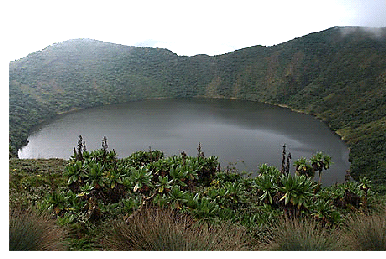Mount Visoke (also Bisoke) is an extinct volcano in the Virunga Mountains of the Albertine Rift, the western branch of the East African Rift. It straddles the border of Rwanda and the Democratic Republic of the Congo, but the summit is located in Rwanda. It is located approximately 35 km northeast of the town of Goma and adjacent Lake Kivu.
The mountain is located within Rwandan Volcanoes National Park and Congolese Virunga National Park. The steep slopes of the peak are densely covered with equatorial rainforest and alpine meadows. The summit does not gather snow, but is often shrouded in fog. Bisoke is one of the mountains considered a habitat for the Endangered mountain gorilla, and the Karisoke Research Center founded by Dian Fossey is located in the valley to the west.
Mt Visoke stands at 3700m, it has the typical conic shape of a “perfect” volcano and in its crater lies a deep crater lake. For those interested in climbing Mt Visoke the volcano does not present an exceptionally demanding climb but it is nevertheless still a tough hike. The high elevation demands extra strength of climbers and the whole excursion can take between 5 hours and the whole day depending on the speed of the walk and the frequency of stops. The ascent typically takes around 3 hours.
An eruption in 1957 formed two small cones on the north flank, 11 km from the summit. The walk around the crater rim is highly recommended. Allow seven hours for the entire trip. Lake Ngezi (9,843 ft./3,000 m), a small, shallow crater lake, is the easiest hike in the park; it takes only three to four hours round-trip from the Visoke departure point.
During the climb, you will cross a series of different vegetation habitats starting with bamboo forests, then moving into Hagenia - Hypericum forest and finally moving through Senecio - Lobelia bush near the summit.
Current park fees for the climb are USD$ 75 per person, this includes the park’s guide and can be purchased on the day of the trek from the parks headquarters, no advance booking is necessary. The trek starts at 07:00am from the Park’s headquarters in Kinigi from where visitors will drive / be driven to the start point of the trek. Porters can also be hired from the park headquarters.
Related Articles:
All you need to know about Golden Monkey Tracking in Volcanoes National Park Rwanda
When is the Best time for gorilla trekking/ tracking in Rwanda and Uganda?
What to wear and take when trekking to see the gorillas?
How to do a 1-Day Rwanda mountain gorilla trekking tour ...
All you need to know about Golden Monkey Tracking in Volcanoes National Park Rwanda
Mountain Gorilla Trekking Tour Packages in Rwanda and Uganda3 days Uganda Gorilla tour
4 days Rwanda Gorilla Tour -
1 day Gorilla trek Rwanda with tour price
2 days Gorilla tracking Rwanda with tour price
3 day Gorilla tracking Rwanda with tour price
5 days Gorillas trek Rwanda and Safari in Queen Elizabeth National Park Uganda
5 days Rwanda, Uganda Gorillas